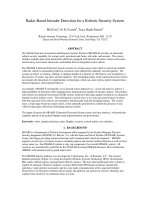Alarms - Electronic Security System
Bạn đang xem bản rút gọn của tài liệu. Xem và tải ngay bản đầy đủ của tài liệu tại đây (103.01 KB, 2 trang )
CIRCUIT IDEAS
ELECTRONICS FOR YOUMARCH 2003
S.C. DWIVEDI
T
his reliable and easy-to-operate elec-
tronic security system can be used
in banks, factories, commercial es-
tablishments, houses, etc.
The system comprises a monitoring sys-
tem and several sensing zones. Each sens-
ing zone is provided with a closed-loop
switch known as sense switch. Sense
switches are fixed on the doors of premises
under security and connected to the moni-
toring system. As long as the doors are
closed, sense switches are also closed. The
monitoring system can be installed at a
convenient central place for easy operation.
Fig. 1 shows the monitoring circuit
only for zone 1 along with the common
alarm circuit. For other zones, the
monitoring circuit is identical, with only
the prefixes of components changing
as per zone number. Encircled points A,
B, and C of each zone monitoring circuit
need to be joined to the corresponding
points of the alarm circuit (upper half
of Fig. 1).
When zone 1 sensing switch S11, zone
on/off slide switch S12, and system on/off
switch S1 are all on, pnp transistor T12
reverse biases to go in cut-off condition,
with its collector at around 0 volt. When
the door fitted with sensor switch S11 is
opened, transistor T12 gets forward biased
and it conducts. Its collector voltage goes
high, which forward biases transistor T10
via resistor R10 to turn it on. (Capacitor
C10 serves as a filter capacitor.) As a re-
sult, the collector voltage of transistor T10
falls to forward bias transistor T11, which
conducts and its collector voltage is sus-
tained at a high level. Under this latched
condition, sensor switch S11 and the state
of transistor T12 have no effect. In this
state, red LED11 of the zone remains lit.
Simultaneously, the high-level voltage
from the collector of transistor T11 via di-
ode D10 is applied to V
DD
pin 5 of siren
sound generator IC1 (UM3561) whose pin
2 is grounded. Resistor R3 connected across
pins 7 and 8 of IC1 determines the fre-
quency of the in-built oscillator. As a re-
sult, IC1 starts generating the audio signal
output at pin 3. The output voltage from
IC1 is further amplified by Darlington pair
of transistors T1 and T2. The amplified
ELECTRONIC SECURITY SYSTEM
K. BHARATHAN
output of
the
Darlington
pair drives
the loud-
speaker
whose out-
put volume
can be con-
trolled by
potentiom-
eter VR1.
Capacitor
C1 serves
as a filter
capacitor.
You
can alter
the alarm
sound as
desired by
changing
the con-
nections of
IC1 as
shown in
the table.
The
circuit con-
tinues to
sound the
alarm until
zone door
is closed (to close switch S11) and the
reset switch is pressed momentarily (which
causes transistor T10 to cut off, returning
the circuit to its initial state).
Fig. 1: Monitoring circuit along with the alarm circuit
The system operates off a 3V DC bat-
tery or recharging battery with charging
circuit or battery eliminator. If desired,
more operating zones can be added.
Fig. 2: Physical layout of sensors and monitoring/alarm system
CIRCUIT IDEAS
ELECTRONICS FOR YOU MARCH 2003
Alarm sound Circuit connections
IC pin 1 connected to IC pin 6 connected to
Police siren NC NC
Ambulance siren NC V
DD
Fire engine Sound NC V
SS
Machinegun sound V
SS
NC
Note. NC indicates no connection
Initially keep the monitoring system
switch S1 off. Keep all the zone doors fixed
with sensing switches S11, S21, S31, S41,
etc closed. This keeps the sensing switches
for respective
zones in closed
position. Also
keep zone slide
switches S12, S22,
S32, S42, etc in
‘on’ position. This
puts the system in
operation, guard-
ing all the zone
doors.
Now, if the door of a particular zone
is opened, the monitoring system sounds
an audible alarm and the LED correspond-
ing to the zone glows to indicate that the
door of the zone is open. The alarm and
the LED indication will continue even af-
ter that particular door with the sensing
switch is immediately closed, or even if
that switch is removed/damaged or con-
necting wire is cut open.
Any particular zone in the monitoring
system can be put to operation or out of
operation by switching on or switching off
the corresponding slide switch in the moni-
toring system.
The circuit for monitoring four zones
costs around Rs 400.









